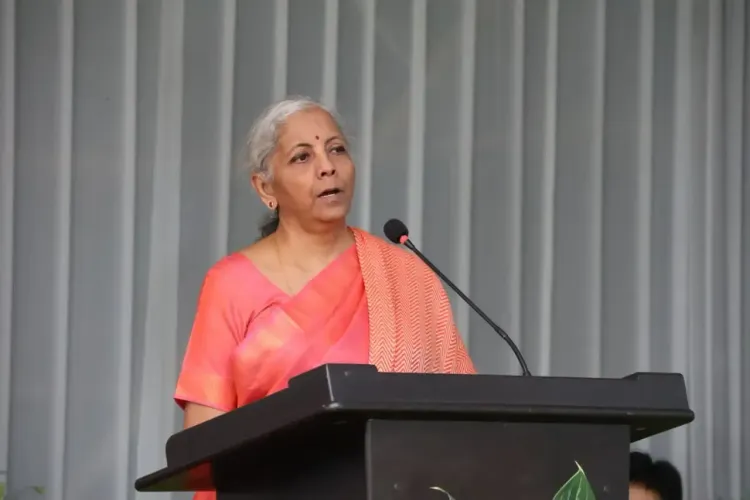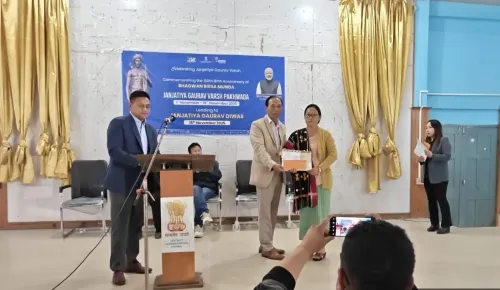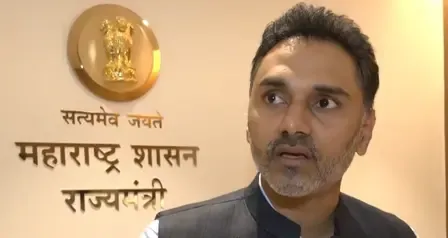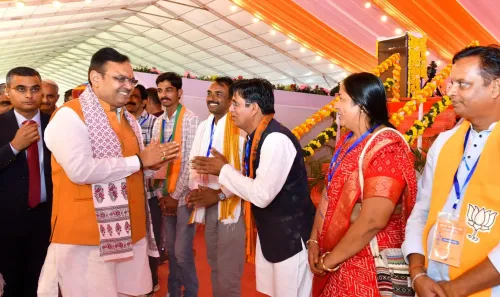How is Nagaland Benefiting from Increased CSR Funding?

Synopsis
Key Takeaways
- Increase in CSR funding aligns with local development priorities in Nagaland.
- Training programs are being established to empower youth with modern skills.
- Collaboration between government and corporate sectors is crucial for sustainable development.
- The center aims to train 100-150 youths annually in various trades.
- Handloom and handicraft sectors play a critical role in Nagaland's economy.
Kohima, Nov 15 (NationPress) The investment in Corporate Social Responsibility (CSR) within Nagaland has witnessed a significant increase, with an emphasis on aligning these funds with local development needs, stated Union Finance Minister Nirmala Sitharaman during her recent three-day trip to the state.
While inaugurating the AI & Future Skills Centre of Excellence at the Nagaland Tool Room and Training Centre (NTTC) in Dimapur, Sitharaman reflected on the concerns raised around 2019 or 2020, where it was noted that CSR contributions were not adequately reaching Nagaland.
This issue, she noted, was echoed by Chief Minister Neiphiu Rio, prompting the state government to host the 2022 CSR Conclave in Nagaland, marking a pivotal moment.
As a result, numerous companies, including those lacking physical operations in the state, were encouraged to engage in impactful CSR projects in Nagaland.
According to Sitharaman, the CSR-backed initiatives at NIELIT (National Institute of Electronics and Information Technology) Kohima and the NTTC in Dimapur exemplify this newfound drive.
For instance, at NIELIT Kohima, the Tata Group is actively involved in training local youth in advanced fields related to semiconductor technologies, with their specialists set to act as master trainers.
Additionally, in Dimapur, the Union Minister disclosed that she had recently urged Cyient Limited’s Executive Chairman B.V.R. Mohan Reddy to introduce high-quality training programs similar to those implemented in Visakhapatnam, Bengaluru, Hyderabad, and other cities, to Nagaland.
He readily consented, demonstrating that distance from corporate centers is no obstacle when intentions are genuine, she remarked.
Sitharaman expressed her pleasure that the training facilities in Nagaland are now offering courses in AI-based production techniques, 3D printing, codings, modern handloom adjustments, and various cutting-edge technologies.
These sectors are revolutionizing global manufacturing and are crucial in ensuring that the youth are not left behind in the face of industrial changes.
The Union Minister praised the enthusiasm of the participants, including those who journeyed from remote districts like Mon.
She acknowledged the state government's collaboration in facilitating these initiatives and aiding CSR partners in establishing impactful, sustainable programs.
She expressed confidence that the creative talents of Naga youth, already evident in their textiles, woodcraft, and artistry, would only flourish with exposure to contemporary tools and emerging technologies.
In her view, these prospects would empower the younger generation to attain improved livelihoods, contribute to Nagaland's advancement, and support the broader vision of a self-sufficient and technologically advanced India.
In his address, Sudatta Mandal, Deputy Managing Director of SIDBI, noted that the center would equip Nagaland's youth with a blend of AI-driven learning and practical vocational training.
The center, established with expertise from SCINT, will initially provide two specialized trades: Handloom and Handicraft, and Software Coding and Robotics, aiming to train 100 to 150 youths annually in each field.
Mandal emphasized the critical role of the handloom and handicrafts sector in Nagaland's economy.
He stated that the training center, featuring two dedicated classrooms, would impart AI-assisted software skills, technical and design know-how, and enhanced training in fabric innovation, enabling artisans to boost productivity, commercial viability, and market appeal.
Mandal also mentioned that SIDBI has been aiding local industry associations in Nagaland through its Development of Industry Associations (DIA) program, which has onboarded over 105 industry associations and benefitted 27,000 MSMEs.
These collaborations aim to connect AI-trained youth with regional industries, addressing the demand for skilled technical workforce in Nagaland and the broader Northeastern region.
In his address, B.V.R. Mohan Reddy of Cyient Limited highlighted India's robust economic performance, citing over 7 percent GDP growth, controlled inflation, and consistent capital investment as evidence of the government's dedication to long-term development.
Reddy praised India for conserving resources while other countries overspent, allowing the nation to now invest heavily in infrastructure and future technologies, including semiconductors, electronics manufacturing, and research and development.









